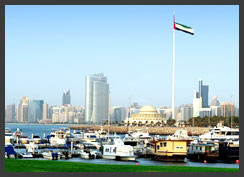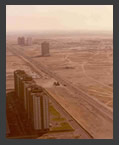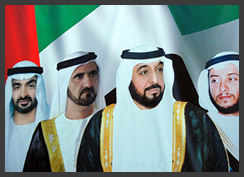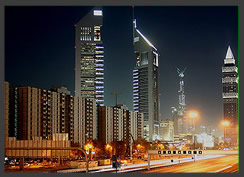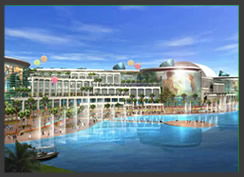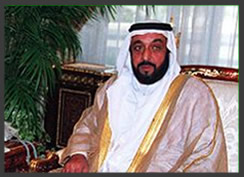UAE Tourism and Tourism in UAE – Online Information
The making of a powerhouse: How the United Arab Emirates (UAE) is transformed to an economic and tourism world class centre of the future.
|
You will not find many countries in the world carrying the term ‘United’ in its official title. In fact, there are only three: the United States of America, the United Kingdom of Great Britain and Northern Ireland and the United Arab Emirates (UAE). The latter state is a federation of seven emirates. These seven emirates are Abu Dhabi, Dubai, Sharjah, Ajman, Umm Al-Quwain, Ras al Khaimah and Fujairah. With a total population of 5 million people, the UAE has not been dubbed a “world power” in recent history, and this is no surprise for a 37-year-old state. Geographically, the UAE might be a small country (with 83,600 square kilometres, it is almost exactly the size of Austria), but economically, it is on its way to being a global superpower. |
||||||||
| More than a “desert country” a Tourism Powerhouse | ||||||||
|
||||||||
|
Unlike in India, the British have never been regarded as colonialists in the UAE and relations between the two countries have always been warm and close. A sound and wise policy of bilateral partnership is the guideline for the UAE’s international relations. In 2007, the UAE attracted over 19 billion dollars of foreign direct investment (FDI). As with many Arab leaders, Sheikh Mohammed, who is also the UAE Minister of Defence, received his military education in the UK, at Mons Officer Cadet School, before studying languages. |
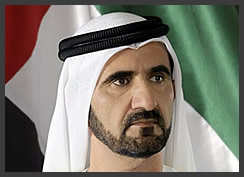 HH Sheikh Mohammed Bin Rashid Al-Maktoum – UAE Tourism |
|||||||
|
|
||||||||
|
|
His liberal views of leading a state in line with tribal tradition and the religion of Islam helped the UAE and its tourism industry on its way to a well-diversified hub for tourism, banking, industry and creativity. Thanks to this creativity the ruling family has managed to attract almost every Fortune 500 company into its 20 free zones. Whether the Jebel Ali Free Port, Dubai International Financial Centre (DIFC) for banks or Dubai Healthcare City for medicines and hospitals, these professional and diverse zones have a few decisive aspects in common: they all guarantee a 50-year-long tax holiday, a free choice of staff regardless of their nationality and 100 percent capital and profit repatriation. |
|||||||
|
|
With so much business going on in Dubai, decision makers from all over the world meet there at numerous fairs and conferences. These include Gitex Technology Week (the biggest IT-fair in the Middle East), Cityscape (the biggest real estate exhibition in the region) and Arabian Travel Market (the most important conference for Travel and tourism in the Arab World and for tourism globally. |
|||||||
|
Once ironically dubbed a “Disneyland in the desert”, the UAE Tourism and especially Dubai must be taken into account when talking about global business and global tourism. If one does not want to hear of the Arab Metropolis and its ruler His Highness Sheikh Mohammed, he or she should remain silent. Western companies were taken by complete surprise, when Emirates Airlines suddenly started to compete against the biggest airlines in the world, and when a Sovereign Wealth Fund from Abu Dhabi pumped billions of dollars into Citigroup or Morgan Stanley in order to save them from near collapse. “If the SWF did not have taken any action at the beginning of 2008, we would have had a major financial crisis”, says Dr. Nasser Saidi, Chief Economist of the DIFC Authority. Liquidity is huge in the Gulf region, estimated at US$ 1.8 trillion. Other investment firms, such as Dubai International Capital (DIC) have also bought stakes in leading Western conglomerates. DIC has a 3.12 percent stake in Europe’s aerospace corporation EADS. Cash is king! Not only are the cash rich SWF and investment companies on a permanent shopping spree, but so are consumers. Therefore, the opening of the Mall of the Emirates, the biggest shopping mall in the Middle East, in 2006 was a logical development. In addition, the world’s biggest shopping mall – Dubai Mall – will be launched soon in Dubai. |
||||||||
|
What is the UAE doing differently compared to the rest of the Middle East, which is normally regarded as a not so peaceful region? Firstly, the UAE adopted a system which offers people from all nationalities the opportunity to work or to fulfil their dreams as entrepreneurs. “There’s also a refreshing lack of bureaucracy. So, I think there are a lot of parallels between life in the growing Asian subcontinent during the 80s and the Middle East now”, says Paul Griffiths, CEO of Dubai Airports. Secondly, the UAE recommends itself as a business hub business as it is a bridge between East Asia and Europe. No country has filled this time zone gap so far. Thirdly, the gulf state took early steps to integrate women into all fields of labour. In 2004, the UAE became the first Arab country with a female minister: H.E. Sheikha Lubna Al Qassimi, a US-educated computer scientist, became Minister of Economy. Today, Sheikha Lubna is Minister of Foreign Trade, and she has been joined by two more female cabinet colleagues. There is also huge progress in the private sector: 45 percent of all banking employees in the UAE are female. |
||||||||
|
|
But being a comparably liberal country does not prevent the UAE from cherishing the values of Islam, which are tolerance, purity, family life and the will to learn. “I am a Muslim, a Bedouin and Emirati”, says Sheikh Mohammed, “and I am proud of my roots which I always take into account when making decisions.” With the formation of a 40-seat elected Federal National Council (FNC) in February 2007, the UAE has also taken steps to facilitate greater participation of its people in the political process. |
|||||||
|
The President, His Highness Sheikh Khalifa Bin Zayed Al Nahyan, expects the FNC to be an incubator for new ideas. Addressing the newly elected FNC, the President expressed hopes that “these ideas would also reinforce security and justice, improve the level of transparency, accountability and integrity, and promote the rights and freedoms.” The Arab society has always been based on tribal systems and Western observers should take this into account when they ask for a Western-style parliament in the Arab world. It would hardly work because it is not consistent with the UAE’s traditions. |
||||||||
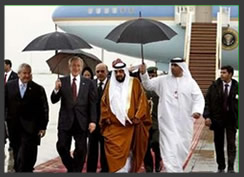 The US President George Bush with HH Sheikh Khalifa Bin Zayed Al Nahyan – UAE Tourism |
Despite a dispute with Iran regarding three islands in the Persian-Arabian Gulf, Sheikh Mo always values warm tones in global politics. Also, HH Sheikh Mohammed did not shy away from protesting against the Israeli attack on civilians in Lebanon in the summer of 2006 and, most recently, against the drums of war against Iran because of its nuclear programme. There are an estimated 400,000 Iranians living in the UAE. |
|||||||
|
The Iranian Hospital of Dubai is regarded as one of the best clinics in the Middle East. Many Emiratis are of Iranian origin or have relatives on the opposite side of the Gulf. Although there is a dispute between the UAE and the Islamic Republic regarding three islands in the Gulf, Prime Minister Sheikh Mohammed always sent peaceful words to Tehran, and strictly opposes a possible US-led military strike against Iran, which could destabilize the entire region. Regarding Iraq, the UAE is already anticipating an economic boom in the country of Euphrates and Tigris. “We’ve got an active presence in Iraq, and we are just specialists focused on what we do”, confirms Shehab Gargash, CEO of Daman Investments, which is one of many privately held investment companies. Mr. Shehab studied in Washington, as did many UAE leaders. The Gargash family is a well-known business family in the UAE and one should remember the name when doing business in the country. Other important names include Al-Futtaim (Retailing), Al-Ghurair (Banking), Al-Rostamani (nearly every sector) and Al-Galadari.At the moment, the big question concerns impact the fall of Lehman Brothers and the near-fall of insurance giant AIG Inc. will have on the UAE and the region. With the decline in oil prices, it is clear that the budget may never revert to the high liquidity levels of recent years. But the transformation of the region from “desert countries” into modern industrial and information societies- bridging the gap between Europe and East Asia – will givethe UAE and Dubai global significance. tags: tourism, UAE,
|
||||||||
